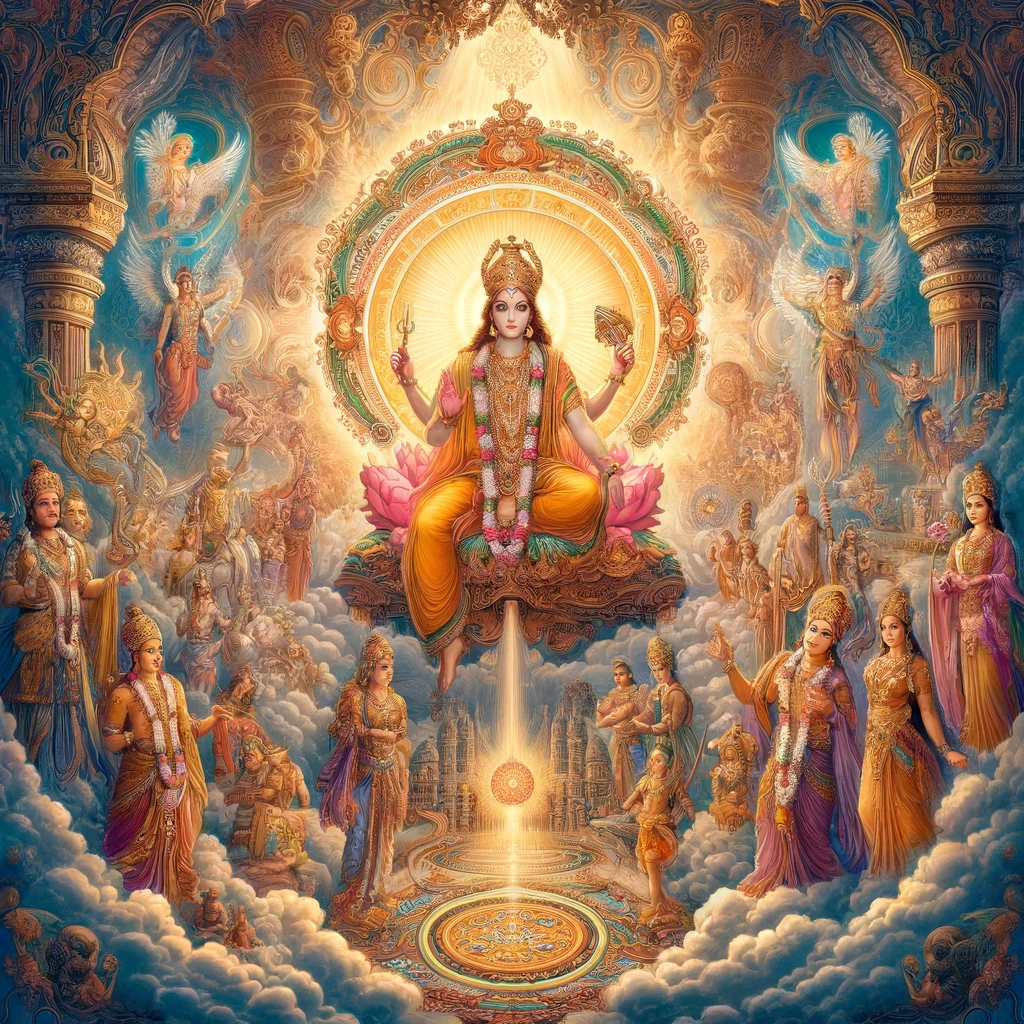(364) vikṣaraḥ (365) rohitaḥ (366) mārgaḥ (367) hetuḥ (368) dāmodaraḥ (369) sahaḥ
(370) mahīdharaḥ (371) mahābhāgaḥ (372) vegavān (373) amitāśanaḥ || 40 ||Top of Form
vikṣaraḥ (ವಿಕ್ಷರಃ)
One meaning of the word "kshara" is "to give continuously," and another meaning is "to perish." "Vikshara" means one who bestows various fruits (results) and one who is indestructible. The Divine is the indestructible power that continuously grants what is desired. "If you ask, you must ask the Divine" - how much did others give when asked? The Divine, Vikshara, continuously grants what the devotees ask for. When we ask the Divine, instead of saying "I want this, I want that," we should say, "Oh Divine, I do not know what I need, please give me what I need." Thus, there is a caution that if we misuse the fruits given by the Divine, who gives endlessly through eternity, He will take them back.
rohitaḥ (ರೋಹಿತಃ)
The name suggests that the Divine is red in color at first glance. As stated in the Upanishads, "Ajam Ekam Lohita-Shukla-Krishnam" means one unborn entity has three colors! Here, 'Aja' does not mean 'goat'. 'Aja' refers to the 'unborn primal principle'. The three colors, red-white-black, respectively signify creation, preservation, and destruction. The color of the Divine, who is the cause of creation, is red, hence He is called Rohita.
mārgaḥ (ಮಾರ್ಗಃ)
The Divine is the principle sought by the wise; the pathway to liberation. The power that everyone must eventually seek and find. He is the boat that crosses the ocean of worldly existence, and the shore that one must reach. The only way to reach Him is through surrender; then He shows the path to liberation. Searching for the way to Him externally will not yield results. Letting go of our external world and making an effort to see the Divine within us can lead us towards the Divine.
hetuḥ (ಹೇತುಃ)
The cause of everything. The Divine is the cause of creation, preservation, destruction, regulation, knowledge, ignorance, bondage, liberation - the cause of everything in the entire universe is the Divine, Hetu.
dāmodaraḥ (ದಾಮೋದರಃ)
At first glance, Damodara means the one whose belly is tied with a rope by His mother. This is a context-specific meaning related to an incident from the childhood of Lord Krishna's avatar; however, the name Damodara has a profound significance inherently. He is Dam+Udara; here, 'Dam' means 'to be favorable to the controlled'. 'Dam' is the opposite of the word 'mad', which means ego or pride, implying the state of being free from arrogance and having control over the senses. 'Udara' means Ut+ara; 'ara' means flaw, so 'udara' signifies the entity that is beyond all flaws, the perfect being. Therefore, Damodara refers to the supreme principle that those with sense control can understand, an immeasurable, everlasting, superior entity that can bestow limitless, flaw-free essence.Top of Form
sahaḥ (ಸಹಃ)
The Divine never loses patience. He is the embodiment of tolerance. The Divine, who conquers evil forces, is compassionate and forgives the offenses of His devotees. Such a Divine is "Saha."
mahīdharaḥ (ಮಹೀಧರಃ)
If you search for the meaning of the word "Mahidhara" in a dictionary, you can find it means "mountains that bear the earth." Even though mountains are on the earth, they are essential for maintaining the stability of the earth. However, this is just the literal meaning. Who truly bears this earth? The earth stands in the sky by the force of Sankarshana (gravitational force). This Sankarshana force (Sesha force) stands in the atmosphere (air force). All these are borne by the Divine. Thus, the Divine bearing the earth and the entire universe is Mahidhara. Only when we let go of the ego that says "I" and "by me," and realize that the all-capable force that bears us all and this nature is the Divine, does this truth shine forth.
mahābhāgaḥ (ಮಹಾಭಾಗಃ)
The main part of the offerings we make during worship reaches the Divine. As stated by Sri Krishna in the Bhagavad Gita: "I indeed am the enjoyer and also the lord of all sacrifices, but they do not know Me in truth and hence they fall (Chapter 9, Verse 24)." We should be mindful of this when we perform worship. It is better to perform worship with understanding. No deities directly accept the offerings that are not dedicated to the Divine. The Divine is also the greatest fortune. Here, fortune means being complete with the six qualities of knowledge, power, strength, wealth, valor, and radiance, controlling the universe.
vegavān (ವೇಗವಾನ್)
The speed of the Divine surpasses the speed of our minds. It is impossible to chase Him in the external world. Such a Divine resides within our inner self. Therefore, we should not search for Him in the external world but look within ourselves.
amitāśanaḥ (ಅಮಿತಾಶನಃ)
Amit+Ashan - means one who eats a lot! The Divine consumes everything yet consumes nothing! He accepts the offerings we make to Him, but we do not perceive it. The Divine is Amit+Ashan; the one who fulfills our endless desires and also makes us devoid of desires, bestowing liberation.


